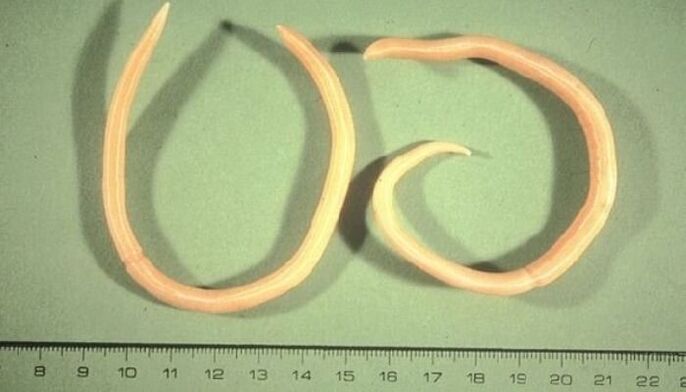
Helminthiasis is one of the most unpleasant and vile diseases. Parasites live in the human body, poison the body and cause chronic diseases. You can even get sick for years without realizing it - this stage of helminthiasis is known as the resolution process.
Since it is impossible to completely prevent worms from entering the body, it is necessary to understand the symptoms they cause, not only in childhood but also in adulthood.
initial symptoms
The main danger of the disease in the first stage is that the parasite is difficult to detect. Symptoms often coincide with the etiology of other disorders.Worm testing is recommended if you notice the following sensations and signs:
- Unreasonable rise in temperature;
- abnormally enlarged lymph nodes;
- Muscle tissue pain and joint pain;
- yellowing of teeth and skin;
- anal itching;
- increased appetite;
- rash on the skin on a regular basis;
- swelling of the legs, arms, and fingers;
- diarrhea;
- abdominal pain and gas;
- a bitter taste in the mouth;
- frequent snoring;
- Insomnia or restless sleep.
Similar symptoms have a 70% chance of indicating invasion. You should consult a doctor immediately and check for the presence of parasites.
important!Even if a medical test of stool and blood does not show the presence of worms, you should still take the medicines your doctor recommends. Analysis does not always detect worms in the first place.
gut
The gastrointestinal tract is the primary habitat for parasites, although they can spread to any internal organ. Once you know what symptoms are present, you can successfully narrow down the types of worms that have settled in your body. What are the signs of worms in the gastrointestinal tract?
- One of the symptoms is joint and muscle pain.
- Fever state.
- Decreased immunity and the development of various diseases of the gastrointestinal tract.
- The total number of eosinophils (a subspecies of white blood cells) in the blood becomes higher.
- Allergic reaction occurs.
Tapeworms cause manifestations that resemble nematode characteristics.If you notice such signs, you should consult a doctor and get a full examination for the different types of parasites.

lung
Equally dangerous are parasites that have already settled in the respiratory system. In some species, the developmental cycle necessarily includes passage of the larvae through the host's lungs. They then return to the gut through the mouth when swallowed.Possible signs:
- First, there is chest pain and tingling.
- Breathing becomes difficult: A person has an episode of shortness of breath and choking.
- Against the background of an uncomfortable and debilitating state of the entire organism, the parasite infects the lungs.
- Body temperature rises rapidly.
- In the morning, the patient wakes up with a cough with phlegm.
- There is a problem with the visual organs.
- The person suffers from widespread allergies.
- The infected lose their appetite. There are signs of toxin poisoning.
- Headache gets worse.
- Vomiting and nausea.
liver
Worms also colonize the largest human glands that perform many vital functions. They disrupt its work and cause dangerous diseases.The following manifestations may occur:
- Anemia develops due to the activity of parasites. Hemoglobin concentration and total red blood cell count decreased. Loss of concentration. The patient's skin becomes pale and tired quickly with any activity.
- The chair was liquefied.
- Symptoms such as swelling and itching occur.
- Everyone feels pain.
- The patient developed a fever and began to lose weight rapidly.
- People infected with worms often get sick and vomit.
- Appetite worsened significantly.
- The liver appears to be enlarged.
- severe hives.
- The patient looks sick.
important!In advanced cases, parasites in the liver can cause neurological disorders, duodenal ulcers, irritability, headaches, and other dangerous consequences.

eye or brain
Worms that choose visual organs and brains as habitats represent an extreme danger to human life and health. Prompt diagnosis of parasites in these places can prevent brain damage and blindness.
- Eye damage manifests as follows:
- Inflammation of the conjunctiva due to larvae becoming trapped in the conjunctiva.
- The eyelids were swollen like boils.
- The patient feels something moving in the eye.
- Elongated gorgeous lines appear on the skin of the eyelids.
- Conjunctivitis is one of the consequences of parasitic infection of the visual organs.
- Brain damage is indicated as follows:
- Nervousness and breakdown.
- Sleep problems lead to persistent insomnia.
- Drinking becomes difficult. Ingestion of strong beverages can cause severe pain in the head.
- The back of the head and temples are the main areas of pain.
- Depression doesn't stop, it only gets worse.
- During a headache, people infected with the parasite often get sick and want to vomit.
- Sudden problems with eyes.
Only a qualified doctor can accurately determine the diagnosis. In addition to treatment and hospital examination, if possible, patients are advised to contact a laboratory specialized in diagnosing parasites.
most common symptoms
Most roundworms or tapeworms have many signs of infection. After identifying the main consequences, it is worth moving on to identify a specific type of parasite for effective treatment with appropriate drugs. Possible symptoms of helminthiasis:
- A rash on the skin is one of the main signs of a parasite invasion. It can be common acne, chiria, papilloma, hives or eczema patches.
- Chronic cough does not go away after taking antibiotics and expectorants.
- Decreased immunity will not free the patient from a constant cold state.
- The movement of the worm in the body can cause severe pain in the joints.
- Large worm blockages of the rectum, pancreas, and gallbladder manifest as constipation and bloating.
- Increased nerve activity can cause teeth grinding.
- Problems with the work of the gastrointestinal tract can lead to irritability.
- Inflammation of the upper respiratory tract is accompanied by diseases such as runny nose and pneumonia. In particular, such symptoms are characteristic of strongyloidiasis (intestinal acne) and ascariasis (roundworms) diseases.
- Metabolic disturbances and poisoning by products of helminth activity lead to chronic depressive states.
Symptoms will allow an experienced therapist to differentiate between a parasitic infection and a disease with similar symptoms. During the active stage of reproduction, the diagnosis is clarified with the help of tests.

Symptoms of infection in children
Worms are very dangerous to young representatives of humans. The timely detection of parasites in children is critical to their healthy development. Sometimes signs of worms in a child seem harmless, so parents should be very careful.
- If your baby snores in his sleep and doesn't sleep well, consider the presence of pinworms in his fragile body. They affect brain tissue, causing neural responses.
- General and local manifestations of allergic reactions are also characteristic of invasion. Giardia causes the following common reactions: cracked nails, bronchial asthma, rhinitis. Signs of a local reaction include itchy skin, dry cough and asthmatic cramps.
- The consequences of a weakened immune system in children are inflammation of the paranasal sinuses (sinusitis), lesions of the oral mucosa (stomatitis), inflammatory processes in the female organs (vulvovaginitis), and bacterial vaginosis.
- Ascariasis and ascariasis (a broad range of tapeworms) can cause aggression and irritability in children. This is due to the poisoning of the brain by worm waste.
- Hormones produced by certain types of parasites can cause fluid malabsorption in the gastrointestinal tract. This can lead to bowel breaks and diarrhea.
If a person has worms, what symptoms can be detected regardless of age? From depression and allergies to serious illnesses of the internal organs, diseases of the brain and nervous system.Children are particularly vulnerable to the negative effects of parasites.In infants, chronic poisoning with the toxic waste of various worms can lead to mental disorders and developmental delays.
The first symptoms should be an alarming signal that urgent diagnosis and appropriate treatment of an established disorder is needed. Get rid of the worms in your body in time, and the patient will recover quickly and return to the joy of life.
Prompt medical consultation will help determine the exact type of worm, so that an effective treatment program can be accurately instituted.

























